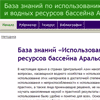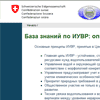
Knowledge base is an organized pool of knowledge on any subject area. Knowledge is the practical understanding of a subject. In other words, knowledge represents acquired truths, facts, principles and other awareness. Therefore, in contrast to a database, the knowledge base comprises information, which is contained in documents, books, articles, and reports.
Subject knowledge bases
Knowledge Base “Land and Water Resources Use in the Aral Sea Basin”
 At present, Central Asian countries have gathered a large quantity of information on practically all issues related to water sector and water use, in particular in irrigated agriculture. However, the use of these materials is complicated enough due to their fragmentariness, sparseness, complicated use and inadaptability to computer technology usage. At the same time, it should be kept in mind that experts and decision-makers, unlike researchers, have no opportunity to study results accumulated in science and practice in full and in detail, and they should present information in a user friendly way. The central idea of development of a knowledge base is to take expertise in land reclamation and water resources, with minimum supplements if possible, and translate it into more formal language of knowledge representation.
At present, Central Asian countries have gathered a large quantity of information on practically all issues related to water sector and water use, in particular in irrigated agriculture. However, the use of these materials is complicated enough due to their fragmentariness, sparseness, complicated use and inadaptability to computer technology usage. At the same time, it should be kept in mind that experts and decision-makers, unlike researchers, have no opportunity to study results accumulated in science and practice in full and in detail, and they should present information in a user friendly way. The central idea of development of a knowledge base is to take expertise in land reclamation and water resources, with minimum supplements if possible, and translate it into more formal language of knowledge representation.
Knowledge Base “Land and Water Resources Use in the Aral Sea Basin” includes the following sections:
- physical-geographical characteristics of the region;
- water resources;
- water resources use;
- desertification and monitoring;
- organizational and legal issues of water resources management and financing.
The development of a knowledge base using state-of-the-art information technologies makes it possible to maximally effectively use an accumulated information base on materials of completed research projects and scientific publications. .
The knowledge base also includes the results of the past field studies on irrigation and drainage in the region. Inclusion of those studies proceeds from a need to ensure the intergenerational continuity. Recently, most graduates of higher education institutions have been coming to water-management organizations without knowledge of experience in irrigation and drainage as gained in Central Asia over the past 20-30 years. It is assumed also that earlier research works are unknown to most foreign specialists who try to assist the Central Asian states in solving water and environmental problems in the Aral Sea basin.
In the database, information being of current interest for Central Asian countries as well as for other regions has been gathered on problems related to desertification, including its monitoring; the effect of irrigation on surface and groundwater and the Aral Sea, etc. The knowledge base will provide users (scientists, experts, ecologists, politicians, and whole society) with necessary and easily accessible information for rational use of water and land resources.
It should be noted once again that the main objective of the knowledge base should be to disseminate advanced experiences, achievements, and methodologies in the field of water sector (specific examples of problem solving, description of pilot projects and so on), distributed through knowledge tree branches (by subheadings): irrigation, drainage, hydro structures, etc.
Knowledge Base “Integrated Water Resources Management: Central Asian Experience”
 This knowledge base is aimed at a wide range of specialists–water management professionals, including policy-makers in the water sector who define trends and meaning of modern reforms of water governance and management.
This knowledge base is aimed at a wide range of specialists–water management professionals, including policy-makers in the water sector who define trends and meaning of modern reforms of water governance and management.
At the same time, this knowledge base is also intended for a wide range of civil society’s representatives interested in proper implementing water management reforms.
A content of this knowledge base allows our users to be imbued with recognizing that civil society and nature face the serious problems related to water resources all over the world. At present, these challenges cannot be efficiently tackled using the customary, prevalent during last decades, traditions, governance structure, and methods of water management. Integrated Water Resources Management (IWRM) is here treated as a new promising approach to solving the abovementioned problems.
First findings of introducing this new approach in Central Asia are generalized in the present knowledge base.